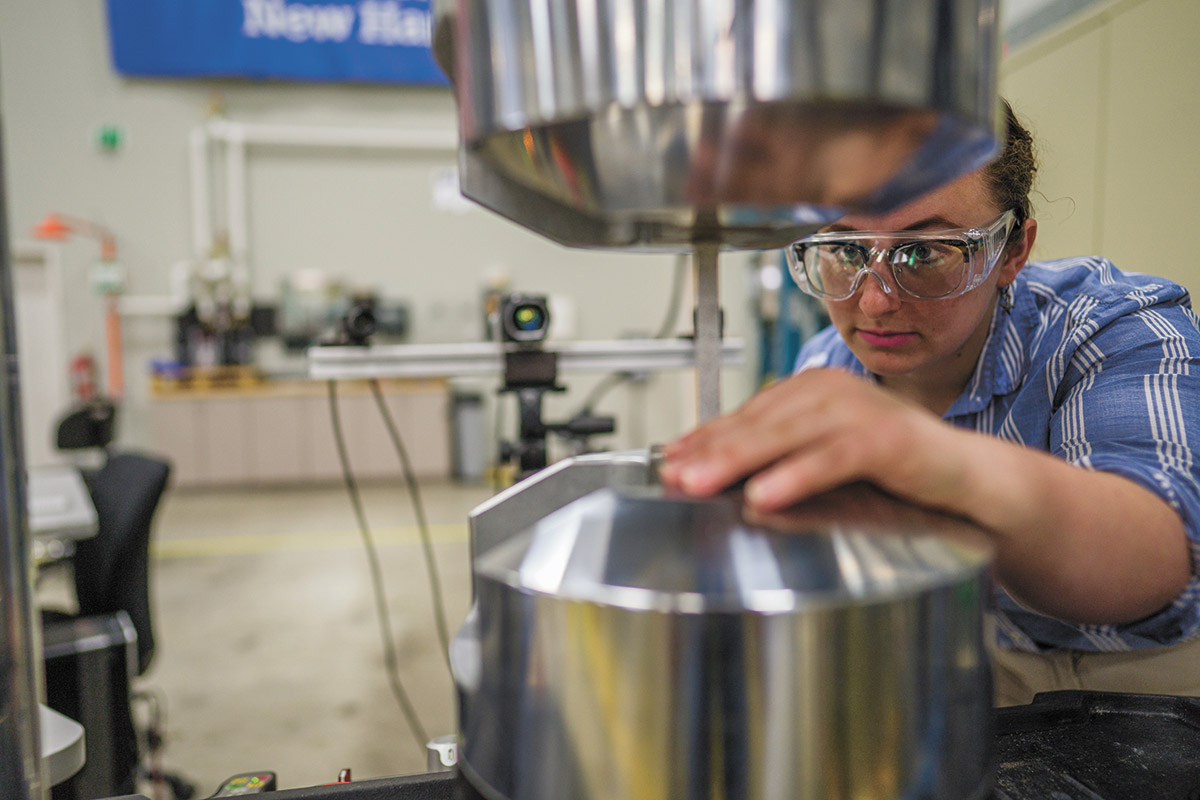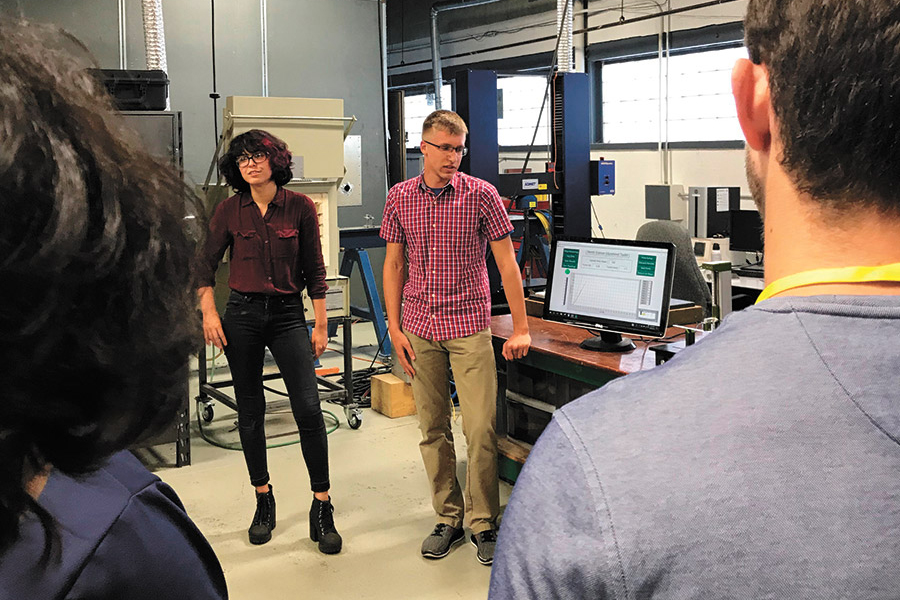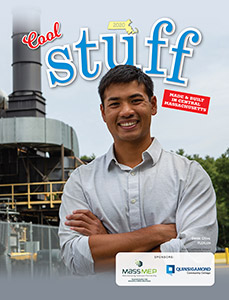Students from across New Hampshire are launching careers in advanced manufacturing

Photo by Michael Papetti
Patrick Dodge became interested in manufacturing in high school after joining the FIRST Robotics Program – a robot-building contest founded by legendary inventor Dean Kamen.
There, he was introduced to CADD (Computer Aided Design and Drafting) as well as electronics, wiring and programming.
FIRST sparked his interest in the Robotics and Automation Engineering Technology (RAET) program at New Hampshire Technical Institute (NHTI).
Patrick Dodge, 20
Position: Technical Operations Intern II
Company: BAE Systems, Nashua
Hometown: New Boston
Salary: $18.50/hr
Giving back: I love traveling and going on community service trips. In March 2018, I traveled to Houston to help hurricane Harvey victims. In March 2019, I traveled to New Orleans to help out Hurricane Katrina victims.
“In the RAET program, I was exposed to a wide variety of topics including PLC programming, complex circuit analysis, C++, CADD, and even programming robotic arms,” said Dodge.
Parts designer
Dodge chose to intern at Nashua manufacturer BAE Systems because of its dedicated culture.
“The technology they develop at BAE Systems literally saves lives every day, and everyone plays a role in their mission,” said Dodge.
He works in the Continuous Improvement Department in Nashua as a technical operations intern. Some days, he designs, 3D prints, and tests new fixtures and tools.
“In just a couple months I have designed parts that are being utilized in almost all of the factories here in New Hampshire,” Dodge said.
Dodge plans for a bachelor’s degree at the University of New Hampshire Manchester in electrical engineering technology, and then a three-year master’s program offered through BAE that rotates students through new positions.
“I’m hoping that by experiencing a wide variety of opportunities, I’ll be able to choose the right career path that best suits me,” Dodge said.

The long road
It is said that the path to our destination is not always a straight one. This rings true for Marguerite Kennish, a former pizza cook and event planner turned mechanical engineer.
Kennish interns at UNH’s John Olson Advanced Manufacturing Center. She learned of the Center last year while earning her associate’s in engineering at Great Bay Community College.
Marguerite Kennish, 24
Position: “The Intern”
Company: UNH John Olson Advanced Manufacturing Center, Durham
Hometown: Brentwood
Salary: $15/hr
RPG: She loves to play role-playing games, and her current favorite is called “Monster of the Week.”
Her project is with Mohammad Ali Davar Panah, a post-doctoral scholar, and Brad Kinsey, the interim director of the Olson Center, on sheet metal forming for patients requiring trauma fixation. Her work is used to create implants and hypodermic needles.
Kennish performs uni-axial testing on an MTS Landmark 370 machine to create a material profile of the stress and the strain caused by loading a specimen. Finite element analysis programmers then simulate data predicting how the material and product will react with different loads.
“It’s been a lot of fun. [Panah] is a good influence. He always questions me when he wants me to be the most successful – and then it looks like we’re going back to the drawing board!” she said.
Her internship is supported by the National Science Foundation under the INCLUDES initiative (Inclusion across the Nation of Communities of Learners of Underrepresented Discoverers in Engineering and Science), aimed at broadening participation in STEM fields.
The project comes through the NH Advanced Manufacturing Partnership (AMP), which sets up work-based learning internships for students transitioning from Community Colleges into UNH.
She has been working with NH BioMade, a $20-million, five-year National Science Foundation-funded biomaterials manufacturing research grant, whose goal is to accelerate the biomedical industry in New Hampshire.
“I’m not trying to plan too far ahead, just taking it one day at a time,” she said of her career path.
Kennish’s caution is well-founded: she already has culinary and management degrees from Lakes Region Community College as well as experience in the service industry.
She said the pace of research is better for her than a bustling restaurant.
“At the Olson Center, you come in with a list of problems that you want to solve, but something always comes up and forces you to slow down as you find new problems to solve,” said Kennish.

Diversifying skills
Luciana Custer is a biotechnology and bioengineering student who wanted to try something different for her internship experience.
“I’ve mostly been involved in biomedical projects, but this summer I accepted an internship at Mentis Sciences through the AMP program,” said Custer.
Like Kennish, she’s also transferring from GBCC to UNH this fall.
She said this internship isn’t typical for someone in her field.
Luciana Custer, 21 (on Left)
Position: Intern
Company: Mentis Sciences, Manchester
Hometown: Jacksonville, NC
Salary: $15/hr ($7.50/hr from Mentis, $7.50/hr from NH Advanced Manufacturing Partnership)
Renaissance woman: “I’m an artist, amateur programmer, website designer, wanna-be polyglot, blacksmith, crocheter, and more. I’ve always jumped between hobbies and fields with enthusiasm.”
“I believe in diversifying my skill set as much as possible,” saod Custer. “My main goal is to take advantage of these opportunities so I can apply an interdisciplinary approach to my ultimate desire, researching mental illness.”
At Mentis she performed technician-level work like machining composites on CNC or manual mills, and helped support the shop with projects like making angle gauges.
Custer connected well with Jon Diaz, a former Community College intern who’s now a senior engineer.
“He was eager to teach and show me how to use any machine we had,” said Custer. “Jon Dignam, the CEO, had a good point he made to the interns: We can’t see a path from ourselves to CEO, but Jon Diaz is young enough that we can see how he got where he is and take inspiration.”
Also like Kennish, Custer’s career goals are fluid.
“I’d love to do research into the biochemical/neuropsychological root of mental illness,” Custer said. “I’ve considered applying for MD-PhD programs to become a physician-scientist, but I’ve been offered a lot more support to go into engineering.” ◾


